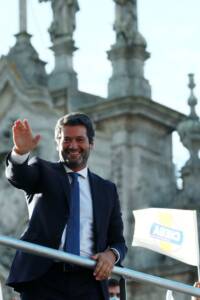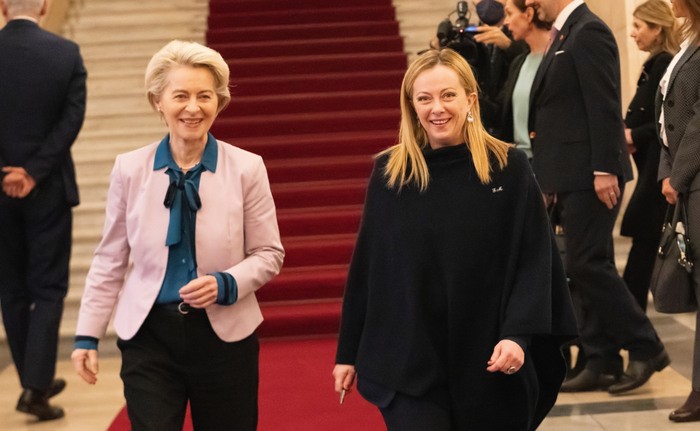Giorgia Meloni is Italy’s first woman prime minister, heading the country’s first real right wing government in a long time. She has a hardline stance on immigration, stands for stricter border controls, is known for her Anti-LGBTQ+ stance, and is strongly opposed to abortion. So what is she doing with Ursula von der Leyen?
The European parliamentary group Identity and Democracy (ID), notable for its anti-globalist stance and comprising members from parties such as Germany’s AfD, France’s Rassemblement National (RN), and Italy’s Lega, convened in Rome on March 23rd for a significant convention. This assembly underscored the collective opposition of its prominent members, including Marine Le Pen of RN and Matteo Salvini of Lega, against the reelection of Ursula von der Leyen as President of the European Commission. Their stance was not only a reflection of their political ideology but also an appeal to Italian Prime Minister Giorgia Meloni, urging her to withdraw support from von der Leyen despite Meloni’s close ties with the European People’s Party (EPP), von der Leyen’s political home.
Join us on Telegram: https://t.me/tfiglobal
During the convention, Marine Le Pen intensified her appeal through a poignant video message addressed to Giorgia Meloni. She posed a direct question regarding Meloni’s stance on von der Leyen’s reappointment, demanding clarity for the Italian populace. Le Pen also took this opportunity to laud Matteo Salvini as the sole right-wing figure in Italy who actively opposes von der Leyen.
This unified stance found an echo in

, president of Portugal’s Chega party, who was present in Rome and praised Salvini for being a defender of European nations.
Read More: Ursula is turning the EU into a MADDER NATO
This consensus within ID starkly contrasts with the divergent views within the European Conservatives and Reformists (ECR) group, another right-wing faction in the European Parliament. The ECR, comprising 17 nationalities with varying strategies toward von der Leyen, showcases internal discord. Notably, Poland’s Law and Justice party (PiS) outright rejects any support for von der Leyen, while Giorgia Meloni’s Fratelli d’Italia seeks assurances for Italy’s recovery plan funds and the future appointment of an Italian European Commissioner.
The rejection of Ursula von der Leyen’s second term as President of the European Commission emerges as a pivotal point of unity among the divergent factions of the French right: Éric Zemmour’s Reconquête party, Les Républicains, and Rassemblement National (RN). Despite their differences, these parties share a common objective to disrupt von der Leyen’s leadership. The Reconquête party, under Marion Maréchal, explicitly stated its opposition to von der Leyen, aiming to dismantle the prevailing centre-left majority if they exceed the electoral threshold of 5% and join the European Conservatives and Reformists (ECR) group.
Les Républicains, associated with the European People’s Party (EPP) parliamentary group and led by François-Xavier Bellamy for the upcoming elections, also expressed its intention not to support von der Leyen’s reappointment. This unified stance amongst the French right starkly contrasts the internal discord within Italy’s ruling right-wing coalition, especially evident during the convention in Rome. While Marine Le Pen vocally opposed von der Leyen, Matteo Salvini of Lega sought to minimize tensions within the Italian government, emphasizing the coalition’s durability and the natural occurrence of differing viewpoints among allies.
Read More: Ursula is making a dangerous mistake with Hungary
The critical stance voiced by Marine Le Pen regarding Ursula von der Leyen’s reappointment as President of the European Commission met with clear disapproval from Giorgia Meloni’s camp. Carlo Fidanza, leading the Fratelli d’Italia delegation in Brussels, emphasized in La Stampa that Meloni opposes directives from foreign politicians, irrespective of their political affiliation. This sentiment, he noted, is particularly potent when such advice emanates from the right, marking a departure from the unwelcome but familiar interference from the left.
Fidanza clarified that Fratelli d’Italia’s decisions are driven by tangible political necessities, highlighting the party’s previous decision not to support von der Leyen in 2019, though he left their stance in 2024 open. Meloni personally perceived Le Pen’s critique as influenced by Matteo Salvini, opting to shift the conversation away from individual leadership to the broader political dynamics within the European Parliament. She argued that the critical objective is forming a center-right majority, suggesting a pragmatic readiness to negotiate with von der Leyen if it advances this overarching goal.








